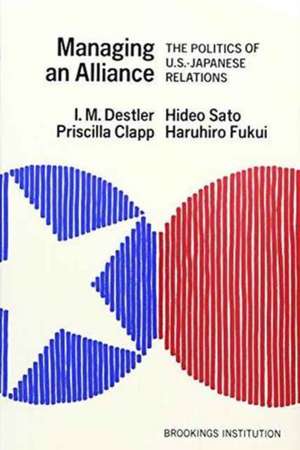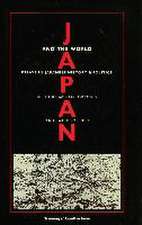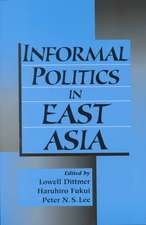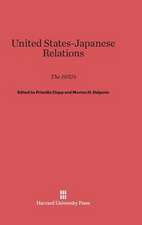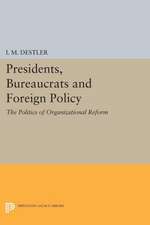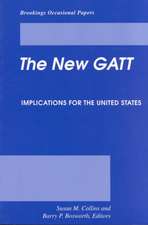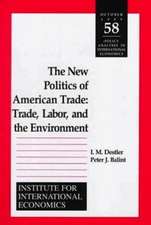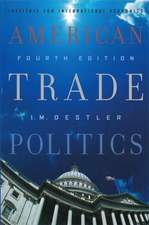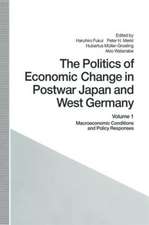Managing an Alliance: The Politics of U.S.-Japanese Relations
Autor I. M. Destler, Priscilla Clapp, Hideo Sato, Haruhiro Fukuien Limba Engleză Paperback – oct 1976
The alliance between Japan and the United States has entered a new era. Successful in promoting mutually beneficial relations during the cold war era, it must now be adapted to a world of detente and new dealings with China. Effective in helping the vulnerable postwar Japanese economy recover domestically and expand its trade internationally, it is now confronted with the different issues accompanying Japan's rise to third rank among the world's economic powers.
The alliance remains important because effective cooperation between Japan and the United States is indispensable to regional stability in East Asia and to a workable world economic order. This study of the politics and processes that influence U.S.-Japanese relations draws heavily on three episodes: revision of the bilateral security treaty in 1960; agreement on reversion of Okinawa to Japan in 1969; and the dispute in 1969-71 over Japanese textile exports to the United States. All three illustrate differences and similarities in the national political and bureaucratic institutions through which policy decisions and actions are taken, how officials in each government perceive actions taken by the other, and recurrent patterns of misperception.
The authors' analysis of U.S. and Japanese negotiating tactics constitutes a guide to effective political management and consensus-building within each country. The study also accounts for the ways in which issues arise, the channels through which they are negotiated, and the effect of actions in one system on decisionmaking in the other. The authors conclude with suggestions about how to reduce tension and promote constructive bilateral relations—suggestions that they believe to be relevant to the conduct of U.S. relations with other major allies.
The alliance remains important because effective cooperation between Japan and the United States is indispensable to regional stability in East Asia and to a workable world economic order. This study of the politics and processes that influence U.S.-Japanese relations draws heavily on three episodes: revision of the bilateral security treaty in 1960; agreement on reversion of Okinawa to Japan in 1969; and the dispute in 1969-71 over Japanese textile exports to the United States. All three illustrate differences and similarities in the national political and bureaucratic institutions through which policy decisions and actions are taken, how officials in each government perceive actions taken by the other, and recurrent patterns of misperception.
The authors' analysis of U.S. and Japanese negotiating tactics constitutes a guide to effective political management and consensus-building within each country. The study also accounts for the ways in which issues arise, the channels through which they are negotiated, and the effect of actions in one system on decisionmaking in the other. The authors conclude with suggestions about how to reduce tension and promote constructive bilateral relations—suggestions that they believe to be relevant to the conduct of U.S. relations with other major allies.
Preț: 189.60 lei
Nou
Puncte Express: 284
Preț estimativ în valută:
36.28€ • 37.96$ • 30.14£
36.28€ • 37.96$ • 30.14£
Carte tipărită la comandă
Livrare economică 03-17 aprilie
Preluare comenzi: 021 569.72.76
Specificații
ISBN-13: 9780815718192
ISBN-10: 0815718195
Pagini: 209
Dimensiuni: 152 x 229 x 12 mm
Greutate: 0.3 kg
Editura: Brookings Institution Press
Colecția Brookings Institution Press
ISBN-10: 0815718195
Pagini: 209
Dimensiuni: 152 x 229 x 12 mm
Greutate: 0.3 kg
Editura: Brookings Institution Press
Colecția Brookings Institution Press
Notă biografică
I. M. Destler is professor and director of the Program on International Security and Economic Policy at the School of Public Affairs, University of Maryland. Priscilla Clapp served nearly thirty years in government under six presidents, mostly in the State Department and overseas.
Hideo Sato is a professor of political science at Yale University. Haruhiro Fukui is a professor of political science at University of California, Santa Barbara.
Hideo Sato is a professor of political science at Yale University. Haruhiro Fukui is a professor of political science at University of California, Santa Barbara.
Descriere
The alliance between Japan and the United States has entered a new era. Successful in promoting mutually beneficial relations during the cold war era, it must now be adapted to a world of detente and new dealings with China. Effective in helping the vulnerable postwar Japanese economy recover domestically and expand its trade internationally, it is now confronted with the different issues accompanying Japan's rise to third rank among the world's economic powers.
The alliance remains important because effective cooperation between Japan and the United States is indispensable to regional stability in East Asia and to a workable world economic order. This study of the politics and processes that influence U.S.-Japanese relations draws heavily on three episodes: revision of the bilateral security treaty in 1960; agreement on reversion of Okinawa to Japan in 1969; and the dispute in 1969-71 over Japanese textile exports to the United States. All three illustrate differences and similarities in the national political and bureaucratic institutions through which policy decisions and actions are taken, how officials in each government perceive actions taken by the other, and recurrent patterns of misperception.
The authors' analysis of U.S. and Japanese negotiating tactics constitutes a guide to effective political management and consensus-building within each country. The study also accounts for the ways in which issues arise, the channels through which they are negotiated, and the effect of actions in one system on decisionmaking in the other. The authors conclude with suggestions about how to reduce tension and promote constructive bilateral relations—suggestions that they believe to be relevant to the conduct of U.S. relations with other major allies.
The alliance remains important because effective cooperation between Japan and the United States is indispensable to regional stability in East Asia and to a workable world economic order. This study of the politics and processes that influence U.S.-Japanese relations draws heavily on three episodes: revision of the bilateral security treaty in 1960; agreement on reversion of Okinawa to Japan in 1969; and the dispute in 1969-71 over Japanese textile exports to the United States. All three illustrate differences and similarities in the national political and bureaucratic institutions through which policy decisions and actions are taken, how officials in each government perceive actions taken by the other, and recurrent patterns of misperception.
The authors' analysis of U.S. and Japanese negotiating tactics constitutes a guide to effective political management and consensus-building within each country. The study also accounts for the ways in which issues arise, the channels through which they are negotiated, and the effect of actions in one system on decisionmaking in the other. The authors conclude with suggestions about how to reduce tension and promote constructive bilateral relations—suggestions that they believe to be relevant to the conduct of U.S. relations with other major allies.
